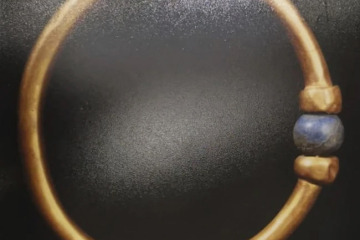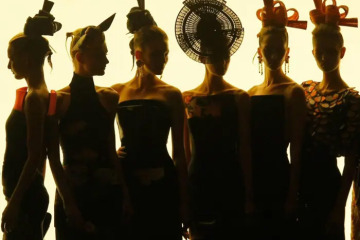New York, February 15, 2024 – They dance together. They sleep in the same bed and complain about each other’s farts. The older of the two, Yi Yan Fuei, is 96. The younger, Chang Li Hua, is 86. They’re in-laws but they act more like sisters.
When Wang, their 29-year-old grandson, was getting into filmmaking, one of the first he made was a short where Yi and Chang feed him blueberries. When Sean refuses, they kill him and bury him in the backyard.
Wang kept shooting them in their Bay Area home, especially after he moved back in with his nearby mom during the pandemic. They got accustomed to his camera being around. But they never thought it would lead to the Academy Awards.
“Wài Pó and Nǎi Nai,” Wang’s deeply charming portrait of his grandmothers, is nominated for best documentary short at the Academy Awards. In it, Wang films Yi and Chang going about their daily lives with bits of playfulness mixed in. They arm wrestle. They play dress-up. They watch “Superbad.” But mostly, “Wài Pó and Nǎi Nai,” which translates as maternal grandmother and paternal grandmother in Mandarin, captures the joy of two spirited ladies in older age as they occasionally chide their grandson’s attempts to turn them into movie stars.
“When you first asked us to be movie stars, we were like, ‘This must be a joke,’” Chang says in an interview by Zoom alongside Yi, with Wang joining from Los Angeles. “But now that we made this movie and it’s going to the Oscars, we do kind of feel like movie stars. Now that this whole experience has happened, we do feel a little prettier.”
When Oscar nominations were announced last month, it wasn’t Bradley Cooper’s or Emma Stone’s reactions that went viral. It was the celebration, caught on video, of Yi and Chang, with Wang, his mom and producer Sam Davis standing over them.
In the film, which is streaming on Disney+, Yi and Chang reflect on mortality and the essential things in life. “As long as I have the newspaper, I can live,” says Yi in the film, with magnifying glass in hand. Now, they’re in the news, themselves.
“Every day I open the newspaper and if I got to see you, that’d be amazing,” Yi tells Wang, who, after translating, shrugged: “I don’t think we’ve made it into the Taiwanese newspapers yet.”
A prominent news story a few years ago partly inspired Wang to make the movie. During the pandemic, when Asian and Asian-American hate crimes were escalating, he saw his grandmothers as a perfect antidote to the hateful stereotyping that followed COVID-19. At the same time, the short, which premiered last year at SXSW, was meant to essentially just be a simple home movie.
“That’s kind of why we made this movie,” Wang says. “It’s just so we could have this recollection, this time capsule that captures the essence of these two women. Long after they’ve passed away, we can have some sort of memento to remember what their lives were like.”
Yi and Chang both grew up in poverty in wartime Taiwan. Their vivacious attitude (“Doesn’t matter if we know how to dance,” Chang says in the film. “We’ll shake our hips.”) is a conscious reaction to hardship they’ve experienced. In the film, Chang notes that days spent sad pass the same as those spent happy. “So I’m going to choose joy.”
“There was so much pain in our childhoods,” Chang says now, tearing up. “Our late lives are so much more fortunate than what we experienced when we were young. And then to be surrounded by our family, there’s so much more joy around us than when we were young.”
That includes Wang who, when not brightening the days of his grandmothers, has emerged as one of the breakthrough filmmakers of the year. At the same time that “Wài Pó and Nǎi Nai” was landing its Oscar nomination, Wang’s feature film directorial debut, Dìdi,” was a sensation at the Sundance Film Festival.
At Sundance, “Dìdi,” a semi-autobiographical coming-of-age comedy about a teenage Taiwanese American skater kid growing up in Los Angeles, won the U.S Dramatic Audience Award and the special jury award for best ensemble cast – a cast that includes Chang as the mother-in-law. Focus acquired the film, the title of which can mean both “little brother” or a term of endearment for a family’s youngest son in Mandarin.
“Surreal and bonkers,” Wang says of the twin successes. “To have these spotlights on global platforms for these stories that come from such a deep personal place is bonkers.”
A through line for Wang in his rapidly unfolding filmography is family. An earlier short of his, “3,000 Miles,” tenderly stitches together voicemails left by his mother while Wang was living in New York. It concludes sweetly in their reunion. To Wang, his role as a filmmaker is to consider his strongest emotions – and more often than not, those feelings are connected to family.
“Making films about my family helps me bridge the gap in my life as a human — seeing my mom not just as my mom or my grandmother not just as my grandmother but as people,” Wang says. “I’m still learning to bridge that gap.”
Now, Wang’s family life will converge, of all places, at the Academy Awards.
“We’re going to the Oscars and I’m going with my grandmas,” Wang says, smiling. “It’s just, like, a sentence I never thought I would say.”
For their part, Yi and Chang describe their feelings about attending the Oscars with their grandson in excited unison. “Wonderful! Wonderful!” they shout in English. Asked who they’re looking forward to meeting, Chang considers for a moment.
“Will Ang Lee be there?” she says.
But amid their disbelief, Chang and Yi think there’s an important lesson to be found in the success of “Wài Pó and Nǎi Nai” that doesn’t have to do with them, but in the grandson behind the camera. Even if the film concludes with Chang cursing Wang as a “freakin’ brat.”
“I want people to realize, especially parents: Don’t force your children to walk the path that you want them to walk,” Yi says. “Encourage them and support them in their interests, and be open to the paths that they’re naturally gravitating towards. Try to water those seeds.”
Yi and Chang have become famous enough that casting directors have reached out to Wang about other movies. Wang recently relayed an audition offer to Chang for a film shooting in New York. She said she’d have to read the script first.
Says Wang: “They’re offer only.” – AP









